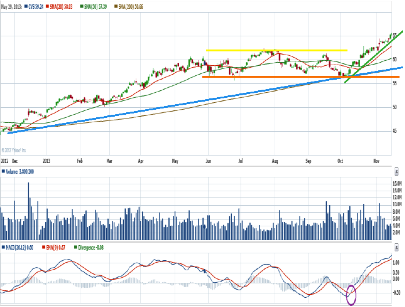The healthcare sector has been one of the best performing industries during the current bull market run. Pharmaceuticals, biotechnology and related companies have all performed well. CVS Caremark (CVS) is no different. Since 2009, the price of CVS gained nearly 123 percent.
That strong performance has only accelerated over the past month, where CVS gained more than 15 percent to close at $65.22 in Tuesday’s trading. CVS is trading above its moving averages. The 50-day moving average ($61.26) and the 200-day moving average ($59.71) will provide support to the price under current levels. In fact, when CVS retreated from its then all-time high at $61 in August, traders resumed buying at the 200-day moving average.
Since then, the 20-day moving average crossed above the 50-day moving average – a bullish short-term signal. Technical indicators give a bullish view of CVS.

REVIEW OF FUNDAMENTALS
CVS’s short-term bullish technical indicators are confirmed with strong fundamentals. The company reported that it earned $1.03 basic earnings per share ($1.02 diluted earnings per share) in Q3. That is a gain from $0.80 basic earnings per share from a year ago. The increase in earnings is attributable to the success of both of CVS’s segments, which benefited from the impact of enlarged generic drugs dispensed, as well as the growth in its Maintenance Choice program.
CVS’s financial strength indicators are quite constructive. CVS’s trailing price-to-earnings ratio of 18.28 is below the industry average of 22.17 and below the S&P 500 average of 18.85. Over the last five years, the company’s shares have traded in the range of 10.37 to 18.50 times trailing 12-month earnings. CVS’s current Price/Sales of 0.63 is above the average of its industry of 0.45.
CVS’s head to head comparison to its main competitors show that the company has one of the lowest gross margins, but one of the highest operating margins in the group. CVS quarterly revenue growth is also above its competitors, while the stock trades at a lower P/E multiple and a leveled P/S ratio. CVS also has the second lowest (best) PEG ratio of all the competitors, which shows that investors are expecting high growth in company’s future earnings. The stock is currently trading below its intrinsic value of $82.50, suggesting that it is currently undervalued at these levels.
CVS’s EPS has grown by 9.59 percent over the past five years. However, on a closer timeframe, current quarter earnings in comparison to the same quarter last year increased by 29.11 percent.
DEBIT CALL SPREAD RECOMMENDATION
Technical and fundamental indicators both show short-term bullish signals for CVS. Investors should consider the following debit call spread: Buy January 2013 $65 calls and sell the January 2013 $67.5 calls for a net debit of $1.05. The price could reach $2.50 if CVS trades above $67.50 at expiration, while the maximum loss is $1.05. Tradespoon’s proprietary algorithm recommends holding until the spread price reaches $2.40, which may occur before expiration.
=
Join the conversation on our Facebook page. We’d love to hear from you.




